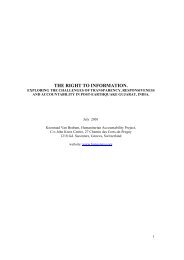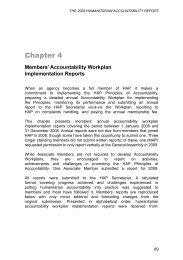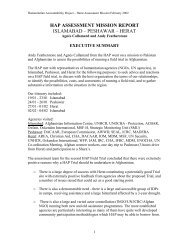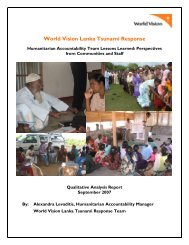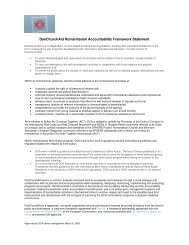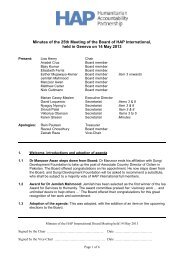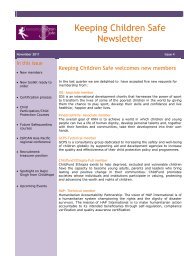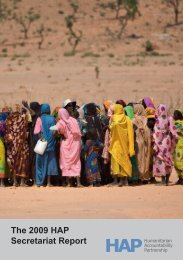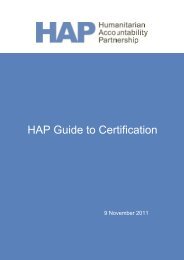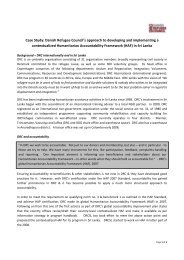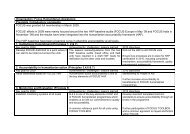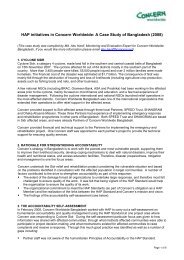Medair - HAP International
Medair - HAP International
Medair - HAP International
Create successful ePaper yourself
Turn your PDF publications into a flip-book with our unique Google optimized e-Paper software.
Preamble / Introductory comments<br />
O r g a n i s a t i o n : M e d a i r<br />
<strong>Medair</strong> (M) continues to hold beneficiary accountability (BA) high up on its agenda. Building on 2007 initiatives, we continued to invest<br />
effort in 2008 in order to improve our ability to respond to the people we serve.<br />
The current work plan, originally written for a 12 month period (April 2007 - March 2008), was extended until December 2008 in order to<br />
align with other <strong>HAP</strong> members’ work plan reporting cycles. The present report covers progress during the 2008 calendar year, and a new<br />
work plan for the period 2009-2011 is under development.<br />
I. Institutional Commitment (Principles 1, 2 & 7)<br />
Key goal 2007-2008 Achievements 2008 2009 objectives<br />
1. Incorporate BA<br />
principles into M corporate<br />
quality management<br />
system<br />
2. Pilot and document BA<br />
methodologies<br />
3. Increase understanding<br />
‣ Continued to promote accountability principles both<br />
internally and externally<br />
‣ Regularly Included BA in field visits’ terms of reference<br />
‣ No new actions were planned in 2008<br />
‣ BA session not held at Country Directors Workshop but<br />
of beneficiary accountability some countries developed in-house presentations<br />
4. Remain aware of other ‣ Promoted the Good Enough Guide, giving copies out to<br />
relevant initiatives and each new field staff during their briefing.<br />
resources<br />
‣ Contact maintained with ECB, People in Aid etc.<br />
5. Increase profile of BA in<br />
external communications<br />
‣ Continued as in 2007, including a section specifically on<br />
BA in one quarterly <strong>Medair</strong> News (July)<br />
II. Accountability in humanitarian action (Principles 3,4,6 & 7)<br />
Key goal 2007-2008 Achievements 2008<br />
6. Country Programmes<br />
develop appropriate and<br />
Afghanistan (AFG)<br />
Approaches taken to ensuring BA within AFG projects are<br />
‣ Undertake ISO field audit (originally planned for<br />
2008) which will have access to all processes in<br />
the field including BA<br />
‣ Circulate regular updates around <strong>Medair</strong><br />
programmes to promote BA best practices<br />
‣ Share BA case studies between programmes<br />
‣ Distribute Good Enough Guide in electronic<br />
format rather than hard copies to all new field<br />
staff during HQ briefings<br />
‣ Continue involvement with ECB, People in AID<br />
‣ Further articles on BA in the field<br />
2009 objectives<br />
apart from continuation of 2008 activities<br />
Afghanistan (AFG)<br />
See under IV below<br />
Accountability Work Plan Report for 2008, <strong>Medair</strong> p.1/9 Submission date: 6 March 2009
elevant beneficiary<br />
feedback systems<br />
elaborated in many proposals, vary depending on context<br />
and include:<br />
Actively collecting beneficiary feedback through<br />
letterboxes/ direct discussions with beneficiaries to<br />
improve projects within project period.<br />
Making project information readily accessible to<br />
beneficiaries, with kick-off meetings held in each project<br />
location; exploring ways to highlight project information<br />
Informing communities about how to submit verbal/<br />
written ideas, recommendations, and complaints to<br />
<strong>Medair</strong>, with follow up visits by male and female staff,<br />
Beneficiary Feedback & Accountability Monitor, and<br />
drop-boxes for anonymous complaint forms. Serious<br />
complaints/ those requiring additional feedback are<br />
investigated by international programs manager.<br />
These methods encourage beneficiaries to be involved in<br />
determining project outcomes according to identified<br />
needs/ requirements.<br />
DR Congo (DRC)<br />
See under IV below<br />
Indonesia (IND)<br />
See under IV below<br />
Madagascar (MDG)<br />
‣ Beneficiary visits to check the satisfaction of water filters<br />
(as reported in website article of 13 February 2009)<br />
‣ Village volunteers (VVs) chosen in each village, as link<br />
between families/ <strong>Medair</strong> staff. Regular meetings with<br />
VVs permit regular feed-back on satisfaction/<br />
suggestions/ complaints about <strong>Medair</strong>’s work<br />
DR Congo (DRC)<br />
See under IV below<br />
Indonesia (IND)<br />
See under IV below<br />
Madagascar (MDG)<br />
Introduce a Rano Tsara partnership BA system<br />
based on public private partnership approach;<br />
more than simply a complaints mechanism, it is<br />
intended to provide a sign-posting service to<br />
beneficiaries, directing them to actor responsible<br />
for each activity and providing opportunity to<br />
share ideas, give positive/ negative feedback<br />
and help shape future actions with aim to:<br />
Accountability Work Plan Report for 2008, <strong>Medair</strong> p.2/9 Submission date: 6 March 2009
Improve beneficiary understanding regarding<br />
who is responsible for what.<br />
Provide mechanisms for improving<br />
communication between partners (local<br />
authorities, beneficiaries, enterprises, <strong>Medair</strong>)<br />
Provide mechanisms for ensuring those<br />
responsible can be held accountable.<br />
Sudan Northern States (SDN)<br />
‣ General: Accountability included in Country Strategy but<br />
not as specific (separate) objective, as standard item in<br />
some (not all) field trip ToRs, as standard cross-cutting<br />
issue in proposals, with BA updates in donor reports;<br />
logframes include participatory indicators; 2nd briefing<br />
for IRS includes sessions on Humanitarian<br />
Accountability/ participatory approaches as standard;<br />
NRS trained in BA, including: encouraging beneficiaries<br />
to invent solutions to problems/ importance of always<br />
explaining & giving an account of <strong>Medair</strong>’s work/ how to<br />
conduct FGDs on BA; interviews conducted by Health &<br />
Watsan teams to survey beneficiaries’ views on <strong>Medair</strong>;<br />
‣ Health: Medical Coordinator undertakes some FGDs<br />
with beneficiaries; regular meetings with Village Health<br />
Committee used to adjust activities; adaption of health<br />
assessment form to give more reliable answers & ask<br />
randomly-selected persons in market (not just those<br />
attending clinics); all health logframes include indicator<br />
on beneficiary satisfaction; workshop held on FGD<br />
techniques for NRS; BA now in NRS job descriptions<br />
‣ Watsan: FGDs conducted to ascertain gaps in water &<br />
sanitation supply; used to inform further work required<br />
Sudan Northern States (SDN)<br />
Sudan Southern States (SDS)<br />
‣ In 2008 <strong>Medair</strong> SDS static health programme carried out<br />
Sudan Southern States (SDS)<br />
‣ As focal point for BA, the newly-appointed<br />
Accountability Work Plan Report for 2008, <strong>Medair</strong> p.3/9 Submission date: 6 March 2009
an internal BISAC (Building Institutional Sustainability<br />
After Conflict) assessment. It is now planning a<br />
beneficiary BISAC assessment as a means of receiving<br />
constructive feedback on its programme activities.<br />
‣ Use of FGDs has also been explored.<br />
Uganda (UGA)<br />
General:<br />
BA a specific cross-cutting theme in country strategy<br />
Briefing for new staff on BA & Good Enough Guide<br />
Pader WASH & Psychosocial teams:<br />
Quarterly Household WASH Survey completed in Mar,<br />
Jun & Oct 08. Final reports of survey sent to subcounty<br />
chiefs, summary put on noticeboards, and sent<br />
to managers/ Country Director (CD)<br />
6 monthly beneficiary satisfaction survey completed in<br />
Sep 08, reports went to the community, district, <strong>Medair</strong><br />
Managers, CD.<br />
Beneficiary newsletter with monthly summary of<br />
health, WASH & psychosocial activities translated into<br />
Luo, sent to all parishes & put up on noticeboards.<br />
Kaabong team:<br />
Dedicated Research Officer (RO) employed Aug to<br />
start working on BA<br />
New beneficiary satisfaction questionnaire developed<br />
3 day Disaster Risk Reduction (DRR) workshops held<br />
with community, as part of ECHO-funded project, that<br />
ensured high level of participation from beneficiaries in<br />
determining needs & shaping how <strong>Medair</strong> responds<br />
with specific Cash for Work projects<br />
Training session held with Kaabong staff on BA<br />
Abim Health team:<br />
External Evaluation health project in Oct 08, included<br />
Quality Assurance Officer will:<br />
• Conduct SWOT analysis on BA in SDS<br />
• Use SWOT results to pilot & develop contextspecific<br />
tools that ensure higher levels of BA<br />
• Promote greater corporate awareness of<br />
<strong>Medair</strong>’s accountability<br />
Uganda (UGA)<br />
Pader team:<br />
<strong>Medair</strong> Health Support Team staff will conduct<br />
a beneficiary satisfaction survey re health unit<br />
services with 10-20 patients on monthly visits<br />
Give Health Centre staff opportunity to<br />
feedback through anonymous questionnaire in<br />
Luo, distributed by HST staff on monthly visits<br />
Give Village Health Teams (VHTs) an<br />
opportunity to feedback every 6 weeks, in Luo<br />
Every 6 weeks, <strong>Medair</strong> VHT to interview<br />
villagers on satisfaction with VHT services in<br />
area. Give training on interview techniques<br />
<strong>Medair</strong> to conduct regular meetings with<br />
district staff at sub-county level, to give local<br />
authorities opportunity to hold <strong>Medair</strong><br />
accountable for activities implemented<br />
Send monthly newsletter to key people in<br />
District & sub-county.<br />
Monthly beneficiary newsletter to be compiled<br />
by Health Manager, translated into Luo,<br />
distributed to district officials & posted on 16<br />
<strong>Medair</strong> noticeboards.<br />
Hold quarterly meetings between <strong>Medair</strong><br />
Managers & sub-county authorities where<br />
<strong>Medair</strong> gives account of health programme<br />
Final Quarterly WASH & beneficiary<br />
Accountability Work Plan Report for 2008, <strong>Medair</strong> p.4/9 Submission date: 6 March 2009
7. Incorporate<br />
accountability principles<br />
into relief worker training<br />
8. Incorporate BA into the<br />
project cycle<br />
9. Mainstream<br />
accountability and<br />
participation into regular<br />
project management<br />
activities<br />
10. BA included in strategic<br />
planning at country<br />
programme level<br />
11. Enhance field<br />
understanding and practice<br />
‣<br />
household surveys to gather beneficiaries’ feedback<br />
Planning for implementation of ECHO-funded health<br />
project included meetings in Jan 08 with Health Unit<br />
Management Committee, Local Councillors, GISO,<br />
Health Centre staff, Village Health Team Peer<br />
Supervisors - to inform about changes in project<br />
approach and to involve in project planning<br />
‣ BA included during ROC seminar in training sessions as<br />
well as in debriefing sessions of practical exercises<br />
‣ BA included in the ‘Project Management’ session during<br />
HQ briefing just before departure (since March)<br />
‣ BA included in the in-country briefing in SDN<br />
‣ BA incorporated as cross-cutting issue in proposals in<br />
all country programmes (second half of 2008)<br />
‣ Measures of satisfaction added in at least one proposal<br />
and logframe in AFG & DRC<br />
‣ BA included in all new job descriptions in AFG & DRC<br />
‣ 2 BA workshops organised for all DRC staff (Apr, Aug)<br />
‣ In DRC, BA included in regular monthly operational<br />
coordination meetings to share experiences between<br />
projects & discuss how to respond to complaints (April)<br />
‣ Inclusion of accountability objectives reviewed as part of<br />
process of releasing new standard Strategy Approval<br />
documents (June 08)<br />
‣ <strong>Medair</strong>’s BA Guidelines disseminated to field<br />
programmes and posted on e-library<br />
satisfaction survey to be completed in Feb 09<br />
Kaabong team:<br />
RO to learn from BA Officer in Patongo<br />
Upward – feedback mechanisms<br />
Revised baseline household survey in Feb 09<br />
Pilot a beneficiary satisfaction survey; in<br />
urban areas to assess hygiene programme &<br />
in rural areas to evaluate DRR programme<br />
Downward – communication plan<br />
Community meetings; initial and follow up<br />
meetings for DRR, PAC, CATF<br />
District officials; CAO, RDC, LC5, sub-county<br />
chiefs & elders receive monthly activity report.<br />
Noticeboards and posters<br />
‣<br />
‣<br />
‣<br />
‣<br />
Accountability Work Plan Report for 2008, <strong>Medair</strong> p.5/9 Submission date: 6 March 2009
of BA<br />
III. Monitoring and Evaluation (Principle 5)<br />
‣ Country Director to run training sessions on BA in each<br />
field location (Uganda)<br />
‣ One MDG programme department (Maîtrise d’oeuvre<br />
socio-institutionnelle), in charge of interaction between<br />
project and beneficiaries, is preparing a BA manual.<br />
Key goal 2007-2008 Achievements 2008 2009 objectives<br />
12. Ongoing learning and<br />
improvement on<br />
accountability issues<br />
‣ Accountability principles included in new Standard ToR<br />
for external evaluations (June 08)<br />
‣ Project monitoring unit set up and run by beneficiaries<br />
‣<br />
13. Improve compliance<br />
with accountability<br />
standards<br />
IV. Addressing Complaints (Principle 6)<br />
themselves (Madagascar, second half 2008)<br />
‣ New Standard Proposal, Interim & Final Reports with<br />
section on BA not yet posted on e-library; pended to<br />
2009<br />
Key goal 2007-2008 Achievements 2008 2009 objectives<br />
14. Models developed for<br />
implementing complaints<br />
handling procedures in the<br />
field<br />
Afghanistan (AFG)<br />
‣ Complaints handling processes put in place in several<br />
project locations; large amount of feedback received,<br />
adequate response mechanisms to be developed<br />
Afghanistan (AFG)<br />
‣ Communications/ M&E Officer will be appointed<br />
during 2009; will address issue of responding to<br />
beneficiary feedback & other BA responsibilities<br />
‣<br />
DR Congo (DRC)<br />
‣ Boxes for anonymous comments on perception of<br />
<strong>Medair</strong> Congo’s work placed in 5 health zones, with<br />
notes on boxes explaining use. Only 15 answers were<br />
collected, all from medical staff that <strong>Medair</strong> supports<br />
through training, incentives etc.<br />
‣ <strong>Medair</strong> therefore does not know what patients as direct<br />
beneficiaries think of <strong>Medair</strong>.<br />
DR Congo (DRC)<br />
To address 2008 shortcomings, <strong>Medair</strong> will:<br />
‣ Provide information next to comment boxes that<br />
includes: <strong>Medair</strong>’s profile/ <strong>Medair</strong>’s mandate<br />
(thus limiting expectations of <strong>Medair</strong> in<br />
beneficiaries’ feedback)/ short list of frequent<br />
comments received & changes made,<br />
explanations when not addressed<br />
‣ Ask beneficiaries to indicate on their comments<br />
if patient/ health staff.<br />
‣ Add <strong>Medair</strong> logo (visibility sticker) on boxes to<br />
Accountability Work Plan Report for 2008, <strong>Medair</strong> p.6/9 Submission date: 6 March 2009
Indonesia (IND)<br />
‣ Nias Island – Feb 2007 to Oct 2008:<br />
8 Village Development Committees established where<br />
water sanitation projects were conducted<br />
Community notice boards placed in 14 locations.<br />
Comments boxes placed on notice boards, feedback<br />
invited. 65 letters received, all replied to<br />
20 beneficiaries in target communities interviewed<br />
Banda Aceh – May 08 to date:<br />
<strong>Medair</strong> continues its one-to-one training sessions,<br />
where problems/ complaints/ feedback are addressed;<br />
if not, a contact number on each training document<br />
(Flyer) handed out enables beneficiaries to call training<br />
teams back. <strong>Medair</strong> staff present in villages if any<br />
urgent issues arise re community feedback/ questions<br />
clarify to patients that comments are directed to<br />
<strong>Medair</strong>, not health centre itself.<br />
‣ Concentrate on 5 health zones where BA work<br />
already initiated<br />
‣ Brief supervisors on re-launching of initiative in<br />
these health zones, e.g. through health centre<br />
committees. Health workers going to rural areas<br />
to inform local population about use of box<br />
Indonesia (IND)<br />
‣ <strong>Medair</strong> is closing this programme during 2009.<br />
It is anticipated that the post-completion<br />
external evaluation will assess beneficiary<br />
satisfaction.<br />
Madagascar (MDG)<br />
Beneficiaries who paid for a latrine: monthly monitoring<br />
of each latrine’s utilisation undertaken for two years after<br />
installation to encourage good usage and cleanliness.<br />
Together with this system, a bi-annual system was<br />
established to question each household with a latrine on<br />
their opinion of <strong>Medair</strong>’s work and about the latrine.<br />
Madagascar (MDG)<br />
‣ See under II above<br />
Accountability Work Plan Report for 2008, <strong>Medair</strong> p.7/9 Submission date: 6 March 2009
15. Ongoing learning and<br />
improvement on field based<br />
complaints handling<br />
mechanisms<br />
Sudan Northern States (SDN)<br />
‣ W Darfur: Signs continue to be implemented at water<br />
points to assist communities in contacting correct<br />
person for repairs<br />
Sudan Southern States (SDS)<br />
‣ Notice boards providing information about <strong>Medair</strong>’s<br />
activities fabricated; will soon be erected in all 7 clinics<br />
in one county in SDS as well as in 7 nearest towns.<br />
‣ No progress yet made with community workshops<br />
planned with village authorities in those 7 places to<br />
discuss and develop complaints mechanisms.<br />
Uganda (UGA)<br />
‣ Complaint letters & requests received by BA Officer and<br />
responded to on a case by case basis in consultation<br />
with sector Managers<br />
‣ 16 noticeboards erected at health centres & parishes.<br />
‣ Learning and models disseminated to field programmes<br />
(Complaints Handling Guidelines, Beneficiary<br />
Accountability Guidelines & ECB Good Enough Guide)<br />
Sudan Northern States (SDN)<br />
Sudan Southern States (SDS)<br />
‣ See under II above<br />
Uganda (UGA)<br />
Pader: Fix complaint box to each notice<br />
board. Health programme management team<br />
to review feedback, responsible manager &<br />
<strong>Medair</strong> Health Coordinator to give response<br />
Kaabong: Complaints handling/ feedback<br />
mechanism – develop simple form for Officers<br />
to use, communicate system to team<br />
Accountability Work Plan Report for 2008, <strong>Medair</strong> p.8/9 Submission date: 6 March 2009
Case Study Example: Good practice in humanitarian accountability and quality management – Summary version<br />
Project IND( ), Construction of Pustu (………clinics), Nias Island, Indonesia<br />
During April 2008, <strong>Medair</strong> Indonesia implemented signboards in 5 villages on Nias Island, and in 5 more villages in May. Each<br />
signboard contained information on: <strong>Medair</strong> in general, <strong>Medair</strong> Nias and information <strong>Medair</strong>’s work in the village (with some pictures).<br />
Each signboard also had a drop-box, with an explanation and forms that beneficiaries could fill in with their suggestions. The dropboxes<br />
were used in the first five villages until 16 June, and in the second five until 14 July. The last four signboards were scheduled to<br />
be implemented on 1 July, with drop-boxes used until 9 September.<br />
Every week, beneficiaries’ suggestion letters were collected from the drop-boxes; by May, 30 suggestions had been received<br />
concerning the following topics: Watsan (5), Watsan/ Construction (2), Watsan Health (2), Non-<strong>Medair</strong> (4), Health (2), Construction (7),<br />
Communications, Thank you notes (3). Each suggestion was responded to with a letter, which the Village Development Council (VDC)<br />
gave to the beneficiaries with a copy of the form they put in the drop-box.<br />
Involvement of Village Development Council (VDC)<br />
Before implementing the signboards, <strong>Medair</strong> informed the VDC about them, and asked them to promote the drop-box. Signboards are<br />
always implemented with someone from the VDC, so that they can be explained again to them. If after four weeks no or only a few<br />
suggestions had been received (< 5 letters), <strong>Medair</strong> promoted the drop-box once more. In collaboration with the VDC, a plan was made<br />
for the new promotion, such as a meeting with the beneficiaries in a church.<br />
Archive<br />
All original beneficiaries’ letters were put in a binder, organized by village, with a number corresponding with an excel sheet (in English),<br />
which gives an overall few of the BAP program in a time frame and a short translation of the letters of the beneficiaries. <strong>Medair</strong>’s<br />
answering letters are in Bahaisa Indonesia and are archived on the BAP manager’s computer. Any promises are documented in the<br />
excel sheet. Photographs were taken of every signboard site, which were filed on the BAP manager’s computer in village folders.<br />
Sample Letter<br />
‘Based on what we had seen in the project site of Pustu construction, all of woods and timbers that provided by contractor for<br />
construction are bad quality. Those timbers are not strong enough and they can get rotten within a short time. Therefore we would like<br />
<strong>Medair</strong> to follow and to recheck as soon as possible before they will install those timbers.’<br />
Plans with regard to: undertaking a baseline analysis, a certification audit, or mid term certification review<br />
N/A<br />
Accountability Work Plan Report for 2008, <strong>Medair</strong> p.9/9 Submission date: 6 March 2009
Progress in / highlights from the field (if not otherwise covered above) / challenges<br />
SDS appointed an IRS as Quality Assurance Officer at the end of 2008 whose responsibilities include BA. AFG is appointing an IRS<br />
with similar responsibilities in 2009. All other <strong>Medair</strong> country programmes have staff tasked with BA except the new programme in<br />
Somalia, where <strong>Medair</strong> is working through a respected local partner.<br />
A key challenge being faced in some <strong>Medair</strong> country programmes is the development of manageable ways to respond to feedback from<br />
tens of thousands of beneficiaries using limited staff capacity on the ground. This issue will be explored during 2009.<br />
Summary / Other comments<br />
<strong>Medair</strong> continues to make steady progress with beneficiary accountability. <strong>Medair</strong> endeavours not to keep it at a theoretical level, but to<br />
put it into practice as well. The focal point for beneficiary accountability at the head office is within the operations department and<br />
therefore close to the programmes.<br />
Progress has been made with mainstreaming BA both in the country programmes and at every level of the organisation.<br />
Accountability Work Plan Report for 2008, <strong>Medair</strong> p.10/9 Submission date: 6 March 2009




